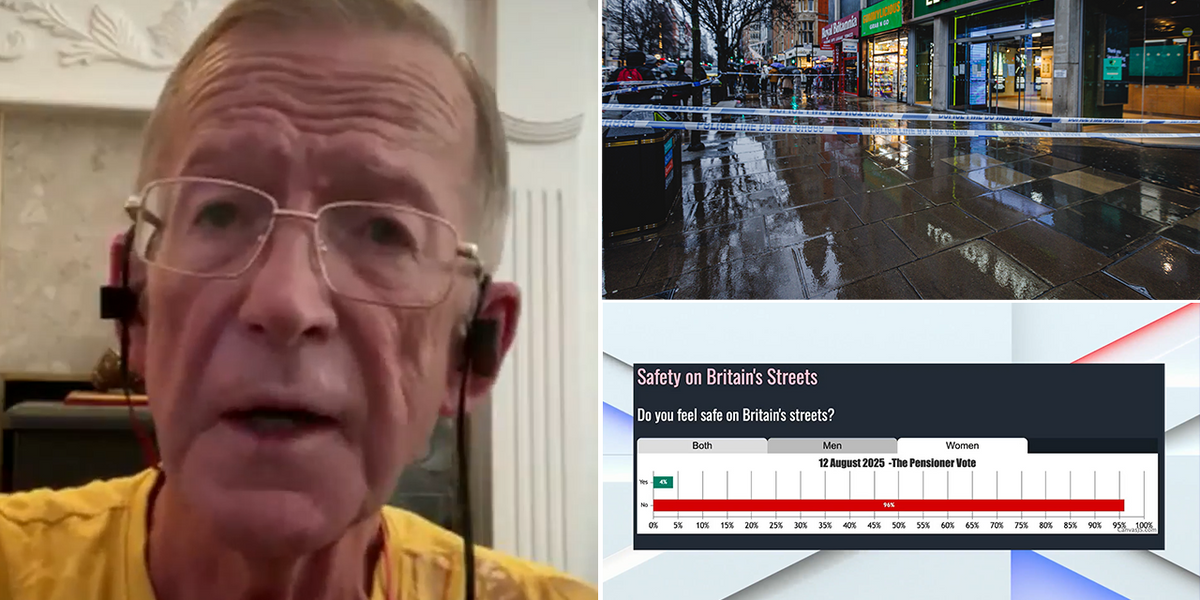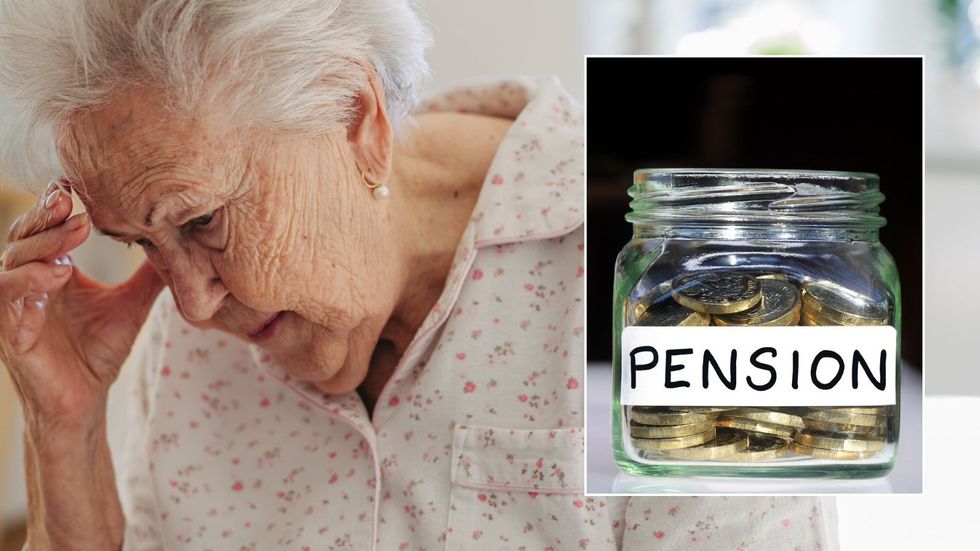



A pensioner residing in Greenwich, London, has admitted on GB News he does not go out after dark because he fears Britain’s streets.
Speaking on the People’s Channel, Fergus McElland was reacting to shocking new figures that suggest 96 per cent of pensioners feel the same way.
The Pensioner Vote asked over 4,000 pensioners and just six per cent said they feel safe to roam Britain’s streets.
McElland made the heartbreaking admission while telling Martin Daubney he takes drastic measures before leaving the house to avoid being the victim of a crime.

McElland made the heartbreaking admission on GB News
|GB NEWS
“I live in Greenwich, three miles in Woolwich where there’s an awful lot of crime”, he said.
“You don’t go out after dark. I’ve got a bad back so I walk with a stick. I always use a headset, my phone is in my pocket and I use a cheap watch.
“Going out after dark is seriously scary. I daren’t. I’ve got a little walking stick, I can’t protect myself.
“I used to be able to 20 years ago but now I stand no chance against a knife and a gun. Lee Rigby was killed three miles from my door.”

Just four per cent said they feel safe on Britain's streets
|PENSIONER VOTE
He was asked about changing cultural habits in Britain and whether that is something that concerns him.
McElland said he is concerned, but particularly for women who are more frequently becoming victims of crime.
“I’ve got female friends in their 50s and 30s. They will not go out after dark and I’ve had to go and collect them from the station”, he said.
“One is a nurse. Very tall, very beautiful. There is no way I would let her walk to the bus stop after dark.
“This is Greenwich, a posh area. But you cannot.”
The Pensioner Vote poll also shows a staggering surge in Reform UK support among pensioners, with over 74 per cent of those asked backing Nigel Farage’s party.
Eight per cent, meanwhile, are backing Sir Keir Starmer’s Labour while seven per cent intend to vote Tory.
Labour has come in for criticism from pensioners since winning the election last year with many affected by the withdrawal of winter fuel support and surging household expenses.

McElland joined Martin Daubney on GB News
|GB NEWS
Research conducted by the Conservative Party indicates that typical energy costs have climbed by £152 since July of the previous year, contradicting Labour's commitment to reduce utility expenses.
Additional financial burdens include projected council tax increases of £109 for standard Band D properties, whilst food and takeaway expenses have surged by £210 annually.
The removal of winter fuel payments has cost affected pensioners an average of £125.
Water charges have increased by £123 annually, with telecommunications costs rising by £46 for phone services and £36 for broadband connections, according to the Conservative analysis.
Vehicle owners face an additional £5 in standard rate car tax.
These cumulative increases mean pensioner households confront total additional costs of £806 this financial year compared to the previous period.
The basic state pension rise proves insufficient to offset these mounting expenses, covering less than half the increased financial burden.
Shadow chancellor Mel Stride stated: "Labour's cost-of-living crisis is hitting pensioners hard. In just one year, pensioners have been left £806 worse off - paying more for energy, water, council tax, and even their phone and broadband bills."
 Britons are worried about their pension savings | GETTY
Britons are worried about their pension savings | GETTY
He added: "After a lifetime of work, our pensioners deserve security in retirement. But Labour's choices are leaving them behind."
Dennis Reed, director of Silver Voices, explained that the April state pension increase had been "dwarfed" by escalating costs, with price increases more than doubling pension rises for most recipients.
Caroline Abrahams, Age UK charity director, emphasised the critical importance of the triple lock mechanism whilst expenses continue to surge, noting that maintaining reasonable living standards on fixed incomes has become extremely challenging.
Recent parliamentary findings highlight the severity of the situation, with MPs calling for a comprehensive national approach to address retirement poverty.
The Work and Pensions Committee reported that 1.9 million pensioners currently live in relative poverty, representing 16 per cent of all retirees.
Between 2021/22 and 2022/23, the percentage of pensioners falling below 75 per cent of the Minimum Income Standard jumped from 5.9 per cent to 9.5 per cent.
A Government spokesperson defended their position, describing the Conservative calculations as "speculative" and arguing they failed to account for additional support measures including the Warm Homes Discount, reduced prescription charges and bus fare caps.
The spokesperson highlighted that the triple lock commitment would deliver a £1,900 increase to state pensions for millions of recipients, whilst their enhanced Pension Credit campaign had resulted in nearly 60,000 additional pensioners accessing financial assistance worth up to £4,300 annually.
They confirmed that nine million pensioners would continue receiving Winter Fuel Payments this year to help during colder periods.
However, the Government acknowledged changes to winter fuel payment eligibility, with Labour pledging to restore the benefit for most pensioners by this winter following widespread criticism of the cuts.
